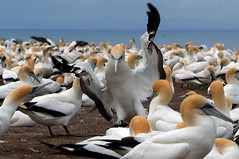 Fast Company has a provocative article out yesterday under their “Big Idea” flag about “obliterating” business travel. Sounds like quite a headline, eh?
Fast Company has a provocative article out yesterday under their “Big Idea” flag about “obliterating” business travel. Sounds like quite a headline, eh?
July 23, 2008
“Within five years, technology will obliterate the need for business travel.” – Inspired by new videoconferencing technologies and rising fuel costs
… Companies too are making an active effort to limit employees’ air travel for the duel-pronged benefits of cutting costs and being environmentally friendly. AT&T has reportedly reduced employee air miles by 15% through video conferencing and Web meetings, while Accenture plans to have 22 video conferencing rooms installed around the world by the end of this year.
OK, I am in firm agreement that we can cut out a lot of business travel, particularly when we are doing things like information dissemination. I cringe each time go to or hear of international gatherings where the structured interaction is all presentation. Thank goodness for meals and coffee breaks. But I think we should seriously rethink large conferences. See Jim Benson’s post on this… But what about the other things we get on airplanes and fly around the world to do, both explicitly and implicitly, with each other? (No, I’m NOT talking about mile-high clubs!)
We know we can do meaningful work and learning with each other at a distance, even without video conferencing. (In fact, please, I don’t want to have to get out of my yoga clothes for a vid!). Sales can happen via online technologies. But is there a “throw out the baby with the bathwater” element here? Will we obliterate business travel, or use is both more sparingly and strategically? I think it is the latter and here’s why.
Learning is not an instant… it is a path
I was chatting with Tony Karrer (lots of good stuff in his blog and at his new venture with Michele Martin, Work Literacy) earlier today about “training.” Oi, such a word. One of my friends says “training is for dogs, learning is for humans.” I’m not quite that rabid (or am I a dog?) but often feel like training is dumping information on people (see this clever slide show for an articulation of this.) We have expectations that training as an isolated act solves a skill or more general learning need.
In my experience, it ain’t that simple. Yes, there are certainly things we can learn and apply with a quick workshop – online or face to face (F2F). But taking learning and deepening it, applying it to work, innovating upon it – that takes time. And it sometimes takes poking at the issue from more than one direction. Working on it over time. Or perhaps with more than one stick. This is where blending online and F2F can sometimes be the thing that puts us over the current hurdle. I learn something online with you today. I go off and work on it. We help each other online. Then we get to meet, have a great meal and we start out talking about our projects, and then we go from there, discovering new learning from each other we never even imagined. Kismet, made possible by the space we create when we take time to meet F2F.
Why is there something important about this F2F stuff? Because so much of learning is nurtured by the social context and sometimes the online social context is not always sufficient for everyone. I find it very satisfying. My sister does not. Have we had some shared experiences to compare? You bet. So those of us who smugly say we can do it all online have not yet found a way to translate those rich experiences to others with different preferences and styles of learning and interacting. And, hey, we still can’t sit down and make/share a meal fully online.
Going F2F creates a different and time bounded social context. We give each other full attention for a limited amount of time. Online, we may spread that attention out – even if we are using synchronous technologies. One of the most powerful gathering experiences for me is being able to work and stay at the same place with people – a research facility, the same hotel, or in a colleagues home. The mix of work and play, of social and intellectual, creates a different sort of stew that jumpstarts my learning differently than online. Being able to “sleep on” what we said today makes tomorrow’s conversation deeper. This F2F stuff is different, not better or worse.
We benefit from that difference. The translocation to another place jostles new ideas and opens us up. We get out of our cocoon and I think that can be very productive. And in my experience, it bolsters and deepens both the learning and the subsequent online interactions.
So lets reduce business travel – it saves time, money and the environment. But lets not obliterate it because there is value in the social learning context of face to face gatherings, particularly ones that open the space for us to create meaning and ideas together. Skip the panel and the presentation. Break out the good food, wine and tea. Let’s sit elbow to elbow, look over each others’ shoulders and let’s get to work. AND, let’s do great things together online.
Photo Credit (CC)
 We missed our partner in crime – er- podcasting,
We missed our partner in crime – er- podcasting,  Fast Company
Fast Company Some days I think I’m turning into a total flake. In 2 weeks Larry and I leave for
Some days I think I’m turning into a total flake. In 2 weeks Larry and I leave for